
Pest Library
A Guide To Common Pests In Southern California
No matter how big or small, when you find a pest in your home or business, you want to know what it is, what problems it’s going to cause you, and, most importantly, how to get rid of it. Our pest library provides you with this information about the pests that most commonly infest Southern California homes and businesses.
Learn More About the Common Pests We See in Southern California
Have questions? We are here to help. Still have questions or can't find the answer you need? Give us a call at 888-694-3707 today!
-
Ants
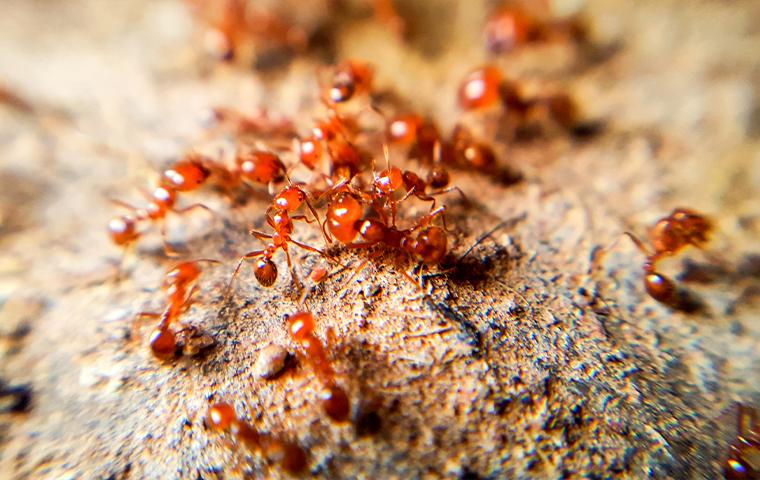 Ants are insects and, like all other insects, have six legs, two bent antennae, and three distinct body regions; reproductive members of the colony have wings. There are more than 12,000 species of ants living worldwide. In our area, some of the most common species that home and business owners deal with include Argentine ants, fire ants, carpenter ants, and little black ants (odorous house ants). Argentine and little black ants are nuisance ants, and while they can spread bacteria and contaminate our food, they pose no significant risks to people or our properties. On the other hand, fire ants and carpenter ants are dangerous species of ants. Fire ants are aggressive and deliver painful, venom-filled stings. Carpenter ants tunnel through and nest in wood, causing significant and costly damage to the structures of homes and businesses.
Ants are insects and, like all other insects, have six legs, two bent antennae, and three distinct body regions; reproductive members of the colony have wings. There are more than 12,000 species of ants living worldwide. In our area, some of the most common species that home and business owners deal with include Argentine ants, fire ants, carpenter ants, and little black ants (odorous house ants). Argentine and little black ants are nuisance ants, and while they can spread bacteria and contaminate our food, they pose no significant risks to people or our properties. On the other hand, fire ants and carpenter ants are dangerous species of ants. Fire ants are aggressive and deliver painful, venom-filled stings. Carpenter ants tunnel through and nest in wood, causing significant and costly damage to the structures of homes and businesses.Ants usually create their main nests outside, often near our homes. Common outdoor nesting spots include our yards, parks, athletic fields, golf courses, and wooded areas. While out and about foraging for food, worker ants often find their way into our homes and other buildings. Once inside, they frequently decide to stay and create satellite nests to expand their colony. Common indoor nesting sites for ants include behind walls, under floors, above ceilings, and behind large appliances. Ants attracted to moisture, and like to build nests near hot water pipes. Potted plants located inside or outside of our homes are also places where ants like to nest. Ants invade properties in large numbers and, because of their tenacious nature and multiple nesting sites, are difficult pests to get rid of without the help of a professional.
Ant prevention tips: In addition to professional services, the following tips will help to protect your property from ants.
Keep tight-fitting covers on trash cans, recycling bins, and compost bins.
Pick up uneaten pet food and keep outdoor eating areas free of food debris.
Remove standing water from your property and repair leaky pipes and fixtures.
Keep ants outside by sealing cracks in the foundation and exterior walls, and installing door sweeps on exterior doors.
Place weatherstripping around windows and doors and repair screens that are loose or torn.
Repair roof damage and place mesh covers over vents and chimney openings.
-
Bed Bugs
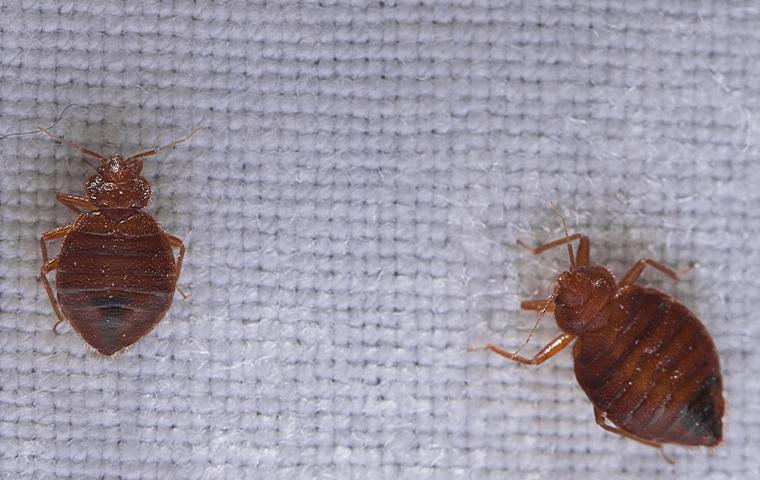 Once almost extinct in the United States, bed bugs made a significant comeback in the late 1990s, and have now become very problematic pests for us. These hitchhiking insects move across all 50 of our states, and the rest of the world, on people and our belongings. Bed bugs are part of the family Cimicidae. They feed solely on blood with human blood being their favorite food source. Identified by their flat, reddish-brown, oval-shaped bodies, bed bugs look like apple seeds with legs. Bed bugs are nocturnal and hide during the day unseen in places like the seams of mattresses and box springs, cracks in wooden furniture and walls, behind wood trim and wall hangings, and in wall voids behind electrical outlets. They emerge at night to feed on the blood of their sleeping victims.
Once almost extinct in the United States, bed bugs made a significant comeback in the late 1990s, and have now become very problematic pests for us. These hitchhiking insects move across all 50 of our states, and the rest of the world, on people and our belongings. Bed bugs are part of the family Cimicidae. They feed solely on blood with human blood being their favorite food source. Identified by their flat, reddish-brown, oval-shaped bodies, bed bugs look like apple seeds with legs. Bed bugs are nocturnal and hide during the day unseen in places like the seams of mattresses and box springs, cracks in wooden furniture and walls, behind wood trim and wall hangings, and in wall voids behind electrical outlets. They emerge at night to feed on the blood of their sleeping victims.While bed bugs are considered nuisance pests, they are prolific breeders, and their numbers can quickly explode after invading a structure. People who are allergic to their saliva develop itchy rashes around the bite sites that are prone to infection. Also, the presence of bed bugs leads to sleepless nights and stress-filled days. At the first sign of bed bugs in your home or business, it may be tempting to try DIY bed bug control methods, but DIY bed bug control is ineffective, potentially unsafe, and ends up costing you your time, money, and sanity. The easiest way to eliminate bed bugs from your property is to contact the professionals at Excel Pest Management.
Bed bug prevention tips: In addition to professional services, the following tips will help to protect your property from bed bugs.
- Keep personal belongings up off of the ground and away from other people's belongings when spending time in public places.
- When traveling, always inspect hotel rooms for signs of bed bugs before bringing luggage and personal belongings inside.
- After returning home from a trip, make sure to immediately wash and dry your clothing on the highest heat setting the fabrics can handle.
- Do not purchase used furniture, mattresses, or box springs for use in your home.
- Make sure to vacuum your house and change and wash bedding regularly.
- Place bed bug-proof covers on mattresses and box springs to help reduce their hiding spots.
-
Flies
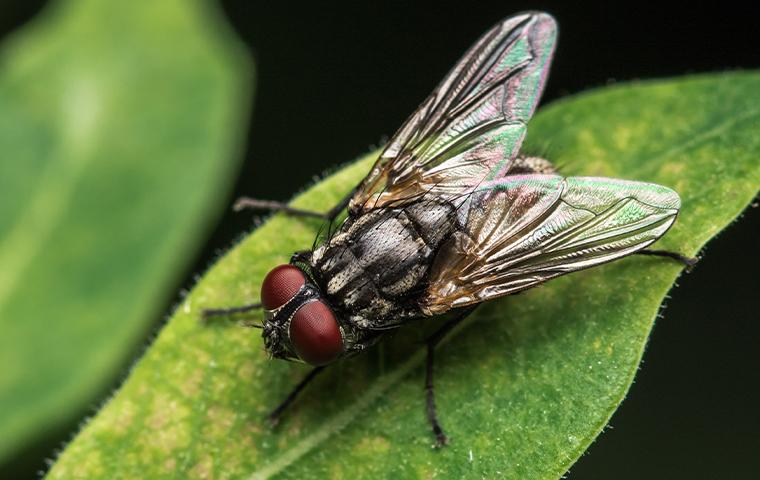 Flies commonly invade homes and businesses, and even though flies have a short life span, they can cause big problems for people. Flies can become a problem on any property that offers them access to food. Many things attract flies to a property, including decaying vegetation, excrement, carrion, fermenting liquid, and food scraps located in trash cans or compost piles. Flies that are buzzing around your property looking for food can find their way indoors through openings around windows, doors, and vents. Once inside, they land on and contaminate food sources, food prep areas, and other surfaces in your home with the bacteria, parasites, and viruses they carry on their legs and bodies.
Flies commonly invade homes and businesses, and even though flies have a short life span, they can cause big problems for people. Flies can become a problem on any property that offers them access to food. Many things attract flies to a property, including decaying vegetation, excrement, carrion, fermenting liquid, and food scraps located in trash cans or compost piles. Flies that are buzzing around your property looking for food can find their way indoors through openings around windows, doors, and vents. Once inside, they land on and contaminate food sources, food prep areas, and other surfaces in your home with the bacteria, parasites, and viruses they carry on their legs and bodies.Belonging to the insect order Diptera, which means "two wings," flies differ from other species of insects in the fact that they have two pairs of wings while other species only have one pair. Other physical features of a fly include having soft bodies, six legs, and large eyes. Flies are also prolific breeders and, if the conditions are right, just a few flies can turn into many in a short time. Three of the most common species of flies living in our area that invade homes and businesses are the house fly, drain fly, and fruit fly. They are all types of filth flies, meaning they spread diseases and bacteria that make people sick. As their name suggests, house flies are common invaders of homes and other structures. Drain flies breed in the debris that builds up on sink and tub drains and fruit flies breed and feed on decaying or overripe fruits and vegetables and fermenting liquids.
Fly prevention tips: In addition to professional services, the following tips will help to protect your property from flies.
- Keep flies out of your home by fixing cracks in the exterior walls and foundation of your home.
- Repair torn screens and place mesh covers over vents leading into your home.
- Keep locking lids on trash cans and compost bins.
- Quickly clean up fruits and vegetables that have fallen to the ground in garden areas.
- Clean up after pets daily. Inside your house, store fruits and vegetables in the refrigerator – not on counters or tables.
- Keep drains in bathrooms and kitchens clean and free of debris and wash your dishes daily.
-
Mosquitoes
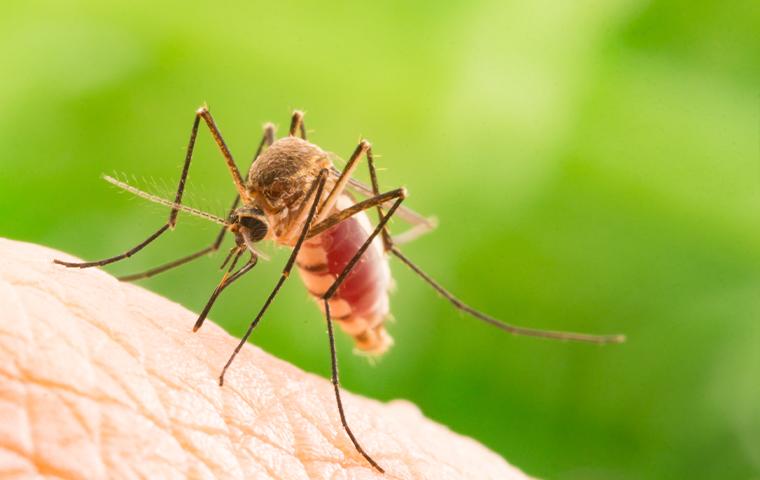 Mosquitoes are a type of biting fly, and the females bite people and animals in order to obtain a blood meal to get the protein required to create healthy eggs. Adult mosquitoes have a narrow body, long thin legs, and a pair of translucent wings. Mosquitos are small, growing to about 1/4 of an inch long, and they are usually gray or brown. Some species will have metallic scales or white markings on their bodies or legs. Mosquitoes have a proboscis: an elongated mouthpart they use for feeding. Females feed on both blood and nectar, while males only feed on plant nectar.
Mosquitoes are a type of biting fly, and the females bite people and animals in order to obtain a blood meal to get the protein required to create healthy eggs. Adult mosquitoes have a narrow body, long thin legs, and a pair of translucent wings. Mosquitos are small, growing to about 1/4 of an inch long, and they are usually gray or brown. Some species will have metallic scales or white markings on their bodies or legs. Mosquitoes have a proboscis: an elongated mouthpart they use for feeding. Females feed on both blood and nectar, while males only feed on plant nectar.Female mosquitoes lay their eggs on top of standing water. Things like ornamental ponds, birdbaths, wading pools, clogged gutters, leaky outdoor faucets, trash can lids or tarps, and containers that collect water, all act as breeding sites and attract mosquitoes to properties. Mosquitoes are fast breeders and can develop from egg to adult in as little as four days. Newly developed adults can travel between one and three miles in search of food but tend to live within a few hundred feet from where they hatch. Mosquitoes are also attracted to properties that offer resting spots. During the heat of the day, mosquitoes rest in tall grasses, under trees, behind tree bark, along fence lines, in dense vegetation, and under decks. Female mosquitoes feed on the blood of many human and animal hosts, giving them the ability to spread dangerous diseases, including the West Nile virus to people, and parasitic heartworms to our pets.
Mosquito prevention tips: In addition to professional services, the following tips will help to reduce mosquito numbers on your property.
- Get rid of their access to breeding grounds (standing water) on your property.
- Store containers that collect water upside down when not in use, keep gutters free of debris, and repair low lying areas in yards and driveways.
- Keep your lawn cut short and remove any overgrown vegetation from your property. Limit the amount of flowering vegetation planted near your home.
- It is also a good idea to avoid spending time outside at dawn and dusk when mosquitoes are most active and to wear a mosquito repellent when outdoors.
- Stop mosquitoes from finding their way into your home by repairing torn screens and keeping doors and windows closed as much as possible.
-
Rodents
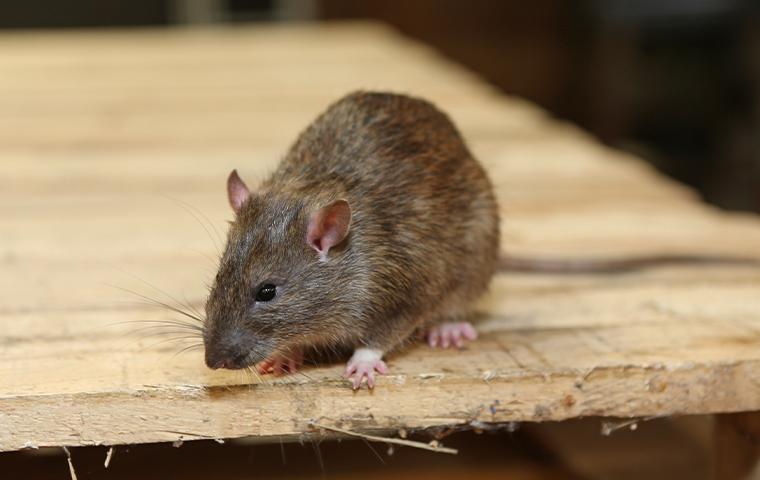 Rodents are common invaders into homes and businesses, and you should never ignore their presence around your property. Rodents are dangerous pests, and these four-legged, furry animals spread disease, contaminate food, and because of their constant need to chew, can cause a lot of damage to our properties. Lymphocytic choriomeningitis (LCM), salmonellosis, hantavirus, rat-bite fever, and leptospirosis are all spread by rodents. Also, rodents carry on their backs and onto our properties disease-spreading parasites like fleas, ticks, and mites.
Rodents are common invaders into homes and businesses, and you should never ignore their presence around your property. Rodents are dangerous pests, and these four-legged, furry animals spread disease, contaminate food, and because of their constant need to chew, can cause a lot of damage to our properties. Lymphocytic choriomeningitis (LCM), salmonellosis, hantavirus, rat-bite fever, and leptospirosis are all spread by rodents. Also, rodents carry on their backs and onto our properties disease-spreading parasites like fleas, ticks, and mites.Rodents are part of the order Rodentia, which means "to gnaw." While rodents come in many sizes and shapes, they all have one thing in common: continuously growing front incisors. To stop their teeth from overgrowing, they chew on anything they come across, allowing them to cause extensive damage to the structures of homes or businesses and anything stored inside. Rodents thrive in urban, rural, and suburban areas. All they care about is easy access to food (garbage, compost, pet food, outdoor eating areas, gardens) and sheltered areas in which to nest. The most common species of rodents invading homes and businesses in our area are roof rats, Norway rats, house mice, and field mice.
Rodent prevention tips: In addition to professional services, the following tips will help to protect your property from rodent damage.
- Keep shrubs, bushes, and tree branches trimmed back from the exterior of your home.
- Place trash cans and compost areas away from the immediate outside walls of your house, up off of the ground, and make sure they have tight-fitting lids.
- Remove bird feeders from your yard and pick up uneaten pet food between feedings.
- Maintain garden areas by picking up fruits and vegetables that have fallen to the ground.
- Use a caulking gun to seal cracks in the foundation, exterior walls, roofline, and spaces around utilities entering into your home.
- Place mesh covers over vents and chimney openings.
-
Termites
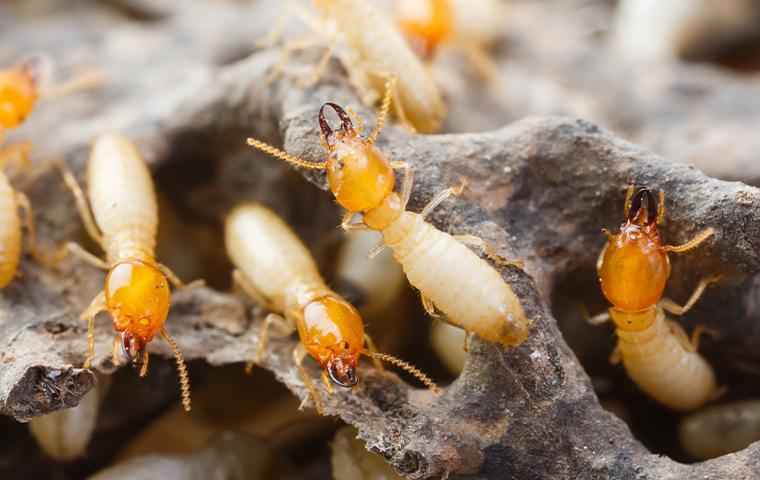 Social insects that feed on wood and other plant matter, termites are a formidable pest to deal with when they invade our homes, businesses, and other structures. Keeping termites away from your property is vital to protecting both your structure and your bank account. Termites are responsible for causing billions in dollars in damages across the United States each year, and to make matters worse, most homeowners' insurance does not cover the costs because termite infestations and their subsequent damage are preventable. The best way to prevent termite damage is to partner with an experienced pest control company like Excel Pest management. Our professionals will take care of current problems you may be experiencing with termites and prevent future issues with these wood-eating, destructive pests.
Social insects that feed on wood and other plant matter, termites are a formidable pest to deal with when they invade our homes, businesses, and other structures. Keeping termites away from your property is vital to protecting both your structure and your bank account. Termites are responsible for causing billions in dollars in damages across the United States each year, and to make matters worse, most homeowners' insurance does not cover the costs because termite infestations and their subsequent damage are preventable. The best way to prevent termite damage is to partner with an experienced pest control company like Excel Pest management. Our professionals will take care of current problems you may be experiencing with termites and prevent future issues with these wood-eating, destructive pests.Two of the most common species of termites that live in our area are the subterranean termite and drywood termite. As their name suggests, drywood termites feed on "dry" or sound wood not damaged by water. In contrast, subterranean termites are attracted to pieces of decaying or water-damaged wood. Drywood termites make their nests within the wood they are feeding on and cause damage to things like furniture, wooden antiques, doors, support beams, picture frames, flooring, and attic framing. Subterranean termites nest under the ground in the moist soil; they move back and forth from their nest to food source each day. Inside homes and other structures, subterranean termites attack wood located behind walls and under floors. Despite some differences, both species of termites can invade and cause serious damage to any home or business.
Termite prevention tips: In addition to professional services, the following tips will help to protect your property from the damage termites can cause.
- Use dehumidifiers to reduce moisture levels in your home and ventilate crawlspaces.
- Place weatherstripping around windows and doors to prevent rainwater from seeping into your home's walls and repair any leaky pipes or fixtures on your property.
- Replace traditional mulch with rubber mulch or another non-organic material and leave a barrier between any soil or mulch and your home's foundation.
- Before you bring wood furniture, building materials, or antiques into your home, inspect them for termite damage.
To learn more about guarding your property against our area's toughest pests, reach out to Excel Pest Management for effective pest control today!

What Makes Us Different
At Excel Pest Management, we will always put you first. That's why so many people in Stevenson Ranch trust us time and again.
-
Effective & Informative
CommunicationWe have a live operator who answers the phone 24/7, so you can always reach us. -
Customized
Individual ApproachWe don’t do “cookie-cutter” pest control. -
Service With
IntegrityWe are value-driven, not cost-driven. -
Over 3 Decades of
ExperienceFully trained and equipped team who takes pride in their industry experience.

Hear From Our Happy Customers
At Excel Pest Management, your satisfaction is our priority! See for yourself what our customers have to say about working with us.
-
"Made Everything Easy for Me"Josh came in and did the most thorough termite inspection compared to my other 4 bids-- and was the most professional without any of the termite fearmongering some of the other bidders gave us. I would hire and recommend Excel again.- Matt M.
-
"Great service!"Prompt, attentive and always willing to help. They’ve been servicing our property for years now and we are happy to have them here. Davey and Frank are excellent techs, dependable and knowledgeable. I highly recommend them.- Omar F.
-
"Above & Beyond!"I contracted Excel to service our hospital and they delivered above and beyond!- Maggie G.
-
"Highly Recommend"Luis took the time to explain everything which was greatly appreciated and made me at ease that some of these things all homeowners sometimes deal with. I would highly recommend them and will definitely use them for any pest management.- Michael C.
-
"5 Stars"Excel has been servicing our properties for the past 5 years and do an amazing job. Our technician Edgar is always very thorough with service and always goes the extra mile to ensure everything is exceptional. He is a dedicated professional and we are so f- Trina C.
-
"Just a great firm overall!"Very good technical advice and services. Responsive and professional in his work. Also, good experience working with his office folks.- Tee Y.
-
"10 out of 10"Excel did an excellent job from start to finish when helping us with our termite problem. We received excellent customer service from Josh who was always there to answer our questions and helped guide us in the preparation process.- Kimberly F.
-
"Excel is the only company I'll work with."Excel Pest Management has been the only company that goes above and beyond and has really taken pride in their work. My experiences with the company has always been great. If I have any issues they are here the next day taking care of the problem.- Elaine M.